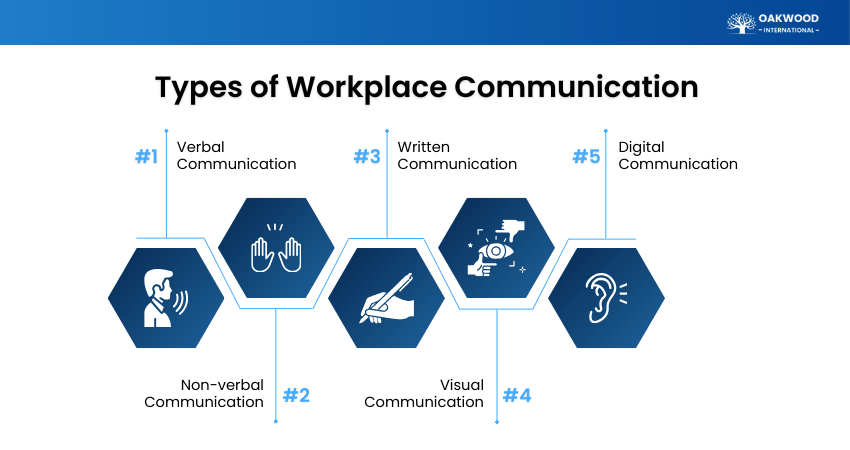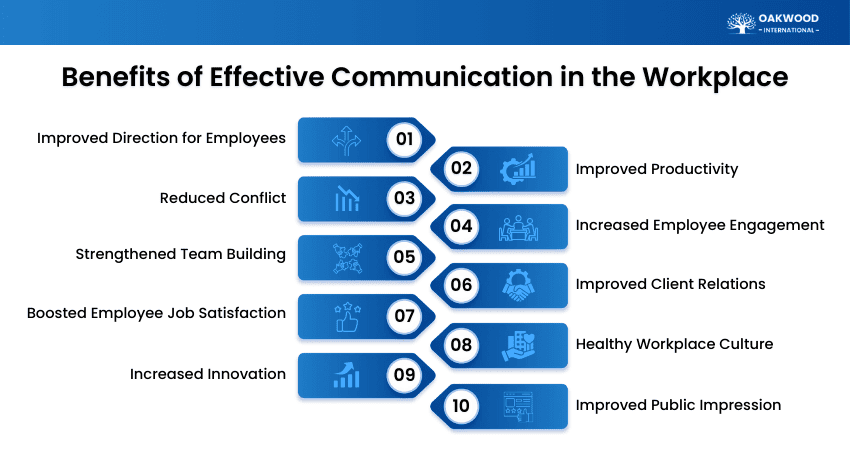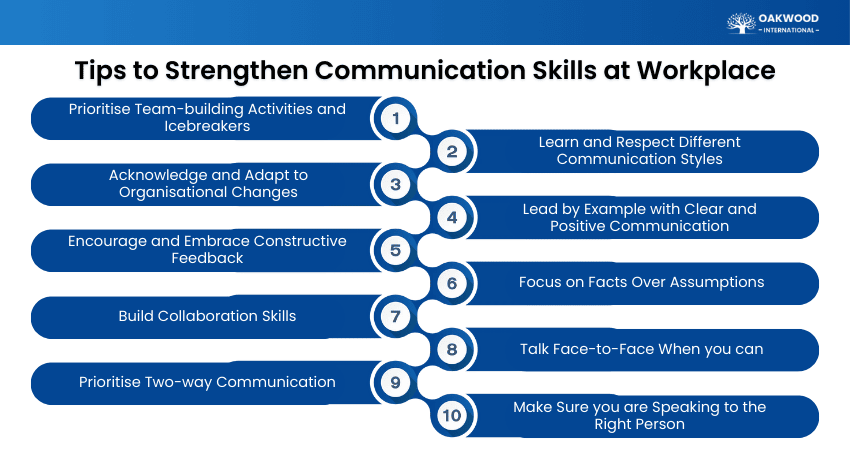Table of Contents


Imagine walking into a workplace where everyone understands each other, tasks flow smoothly, and collaboration feels natural. That’s the power of Effective Communication in the Workplace. It turns confusion into clarity and helps build trust across teams.
Whether you're a manager or a team member, clear communication boosts morale, prevents mistakes, and builds a positive culture. This blog shares simple tips on implementing Effective Communication in the Workplace and making every interaction count. Let’s dive in!
What is Effective Communication in the Workplace?
Effective Communication in the Workplace means sharing information clearly and respectfully so that everyone understands one another. It helps people work together, solve problems, and build trust. Good communication can be talking, listening, writing, or even using body language. It is important for teamwork, smooth operations, and a healthy work environment.
For example, when a manager clearly explains a task to the team, everyone knows what to do and can do their jobs well. If someone has a problem, they should feel comfortable speaking up, and others should listen. This kind of open and honest talk avoids confusion, saves time, and builds stronger relationships at work.
What Makes Communication Effective?
Effective Communication in the Workplace relies on a few key elements that ensure messages are understood and well-received. Here are those elements that you should never miss:
1) Clear and Simple Words: Use easy language so everyone understands. This helps avoid confusion and ensures messages are interpreted correctly.
2) Good Listening Skills: Pay attention when others speak. Active listening shows respect and helps you respond more effectively.
3) Open and Honest Messages: Share the truth politely and clearly. Honest communication builds trust and encourages openness within the team.
4) Right Tone and Body Language: Speak kindly and match your body language to your words. This makes communication more positive and supportive.
5) Timely Responses: Reply at the right time, so work doesn’t slow down. Prompt responses keep tasks moving and improve overall productivity.
What is the Importance of Effective Team Communication in the Workplace?
Effective Team Communication is essential for creating a productive and collaborative workplace. It ensures that everyone understands their roles, responsibilities, and expectations, which reduces further confusion and errors.
When team members communicate openly, they can share ideas, solve problems faster, and make better decisions together. As a result, teams work more efficiently, stay aligned with organisational goals, and achieve better overall performance.
Types of Workplace Communication
Workplace communication takes many forms, each playing a vital role in how information is shared and understood within an organisation. Understanding these types helps employees communicate more effectively, improve collaboration, and reduce misunderstandings at work.
Here are the types of communication in the workplace:

1) Verbal Communication
Verbal communication involves sharing information through spoken words during meetings, presentations, phone calls, or face-to-face discussions. It allows immediate feedback, helps clarify ideas quickly, and strengthens relationships through tone and expression. Clear verbal communication supports collaboration and reduces misunderstandings in daily work interactions.
Key Traits:
1) Uses spoken language to convey messages
2) Allows instant feedback and clarification
3) Influenced by tone, pitch, and pace
4) Encourages open discussion and collaboration
5) Effective in meetings and real-time conversations
2) Non-verbal Communication
Non-verbal communication includes body language, facial expressions, gestures, posture, and eye contact. These signals often reinforce or contradict spoken words, making them crucial for understanding true intent. Positive non-verbal cues help build trust, while negative ones can create confusion or discomfort.
Key Traits:
1) Communicates without spoken or written words
2) Includes facial expressions and body movements
3) Supports or strengthens verbal messages
4) Reflects emotions and attitudes
5) Plays a major role in first impressions
Improve your gestures, posture, and expressions with Nonverbal Communication Training – Register today!
3) Written Communication
Written communication refers to messages shared through emails, reports, memos, policies, and letters. It provides a clear record of information and is useful for detailed or formal communication. Well-written content ensures clarity, consistency, and accountability across the organisation.
Key Traits:
1) Delivered through written documents
2) Provides a permanent reference
3) Requires clarity and structure
4) Useful for formal and detailed information
5) Reduces misinterpretation when written clearly
4) Visual Communication
Visual communication uses images, charts, graphs, diagrams, and videos to convey information. It simplifies complex ideas, improves understanding, and keeps audiences engaged. Visual elements are especially useful in presentations and data-driven discussions.
Key Traits:
1) Uses visuals to support communication
2) Makes complex information easier to understand
3) Enhances engagement and retention
4) Supports presentations and reports
5) Effective for explaining data and processes
5) Digital Communication
Digital communication takes place through online platforms such as emails, instant messaging, video calls, and collaboration tools. It enables fast, flexible, and remote communication across teams and locations. When used effectively, it improves connectivity and teamwork in modern workplaces.
Key Traits:
1) Conducted through digital platforms
2) Enables remote and real-time communication
3) Fast and convenient for daily tasks
4) Supports collaboration across locations
5) Requires clarity and proper etiquette
10 Benefits of Effective Communication in the Workplace
Good communication at work helps everyone understand their roles and work better together. It improves how people work and treat each other. Here are ten key benefits of Effective Communication in the Workplace:
1) Improved Direction for Employees
When communication is clear, employees know what is expected of them. This helps them stay focused and meet goals on time. Clear instructions reduce mistakes and confusion.
1) Tasks are explained step by step
2) Managers give helpful feedback
3) Employees feel more confident
2) Improved Productivity
Good communication helps teams work faster and more efficiently. When people understand their roles, they waste less time. Fewer misunderstandings mean more work gets done.
1) Projects move forward smoothly
2) Less time spent correcting errors
3) Teams finish work on schedule
3) Reduced Conflict
Open and respectful communication prevents small issues from becoming big problems. It helps people express concerns calmly and clearly. Listening to others builds trust and solves issues early.
1) Employees feel heard and respected
2) Disagreements are handled quickly
3) Stronger working relationships
4) Increased Employee Engagement
Employees who communicate well feel more connected to their work. They are more likely to share ideas and give feedback. This helps them stay motivated and involved.
1) Employees contribute to decisions
2) Teams feel more united
3) Higher interest in daily tasks
5) Strengthened Team Building
When team members talk and listen to each other, they build stronger bonds. This leads to better cooperation and support. Teams that communicate well perform better.

1) Better understanding between team members
2) More collaboration on tasks
3) Trust grows within the team
6) Improved Client Relations
Clear communication helps you understand what clients want. It shows that your business is reliable and professional. Good communication makes clients feel valued.
1) Quick and polite responses
2) Clear explanations of services
3) Better client satisfaction
Build trust through better talk with our Assertiveness Skills Training – Join today!
7) Boosted Employee Job Satisfaction
Employees feel happier when they are kept informed, and their voices are heard. It builds trust and makes them feel part of the team. Happy employees stay longer.
1) Open feedback is encouraged
2) Recognition is given regularly
3) Positive work environment
8) Healthy Workplace Culture
Strong communication creates a workplace where people respect and support each other. It leads to fewer issues and more teamwork. A positive culture helps everyone thrive.
1) Everyone feels included
2) Respect is shown in all conversations
3) People support each other
9) Increased Innovation
When communication is open, people share new ideas freely. Teams brainstorm and solve problems better. This leads to fresh solutions and improvements.
1) Ideas are welcomed and explored
2) Creative thinking is encouraged
3) Innovation becomes part of the culture
10) Improved Public Impression
A company that communicates well shows professionalism to the outside world. This builds trust with customers, partners, and the public. It helps the company grow.
1) Clear brand messaging
2) Consistent communication with the public
3) Strong company reputation
Master workplace conversations easily with our Communication Skills Course – Join today!
10 Tips to Strengthen Communication Skills at Workplace
Good communication can improve teamwork, reduce misunderstandings, and create a better work environment. Here are 10 easy tips for Effective Communication in the Workplace:

1) Prioritise Team-building Activities and Icebreakers
Team-building exercises help people get to know each other. Icebreakers are a fun way to make everyone feel comfortable. These activities build trust and improve teamwork. When people connect, they talk more openly.
1) Plan short team games regularly
2) Start meetings with quick icebreakers
3) Celebrate small team wins together
4) Encourage group problem-solving
2) Learn and Respect Different Communication Styles
Everyone has their own way of speaking and listening. Some people like detailed talk, while others prefer quick points. Understanding these styles helps avoid confusion, and respect makes conversations smoother.
1) Ask others how they prefer communication
2) Use simple words with all styles
3) Be patient with different approaches
4) Adjust your tone based on the person
3) Acknowledge and Adapt to Organisational Changes
Changes at work can make people feel unsure. Talking openly about changes helps ease stress. Share updates clearly and ask for feedback. Adapting to change builds trust.
1) Keep your team informed about changes
2) Talk about how changes affect work
3) Allow people to ask questions
4) Stay calm and helpful during transitions
4) Lead by Example with Clear and Positive Communication
If you’re a leader, your words matter more. Speak clearly and stay calm, even during problems. Your team will copy how you talk and act. Positive language builds strong teams.
1) Say "we" instead of "you"
2) Praise effort and progress
3) Stay calm during stressful times
4) Share information clearly and early
5) Encourage and Embrace Constructive Feedback
Feedback helps people grow. Accept feedback with an open mind. Give feedback kindly and clearly. Feedback should help, not hurt.
1. Ask for feedback on your work
2. Say what works before suggesting changes
3. Give examples to explain your points
4. Thank others for their input
6) Focus on Facts Over Assumptions
Always share what you know, not what you think. Guessing can cause problems. If you’re unsure, ask questions. Clear facts make messages stronger.
1) Avoid saying "I think" too often
2) Use data or examples when possible
3) Double-check before sharing info
4) Clarify unclear points immediately
7) Build Collaboration Skills
Working well with others improves communication. Share ideas and listen to new ones. Help each other solve problems. Good teamwork starts with good talk.
1) Use shared tools like group chats
2) Respect everyone’s opinions
3) Divide tasks clearly and fairly
4) Offer help when someone is stuck
8) Talk Face-to-Face When you can
Face-to-face talks help you understand feelings better. You can read body language and tone. This avoids many misunderstandings. It also builds stronger bonds.
1) Schedule short in-person catch-ups
2) Use video calls if not in the office
3) Don’t rely only on emails
4) Smile and use open body language
9) Prioritise Two-way Communication
Good talk goes both ways. Let others speak and really listen. Ask for thoughts and give time to reply. This shows respect and builds trust.
1) Pause and listen during talks
2) Ask for ideas in meetings
3) Repeat key points to show you listened
4) Let quiet team members speak up
10) Make Sure you are Speaking to the Right Person
ves time and avoids confusion, as well as allowing you to share info with the right people at the right time. It helps work go smoothly.
1) Check if the person handles that task
2) Use names in group messages
3) Ask if they need the info
4) Share updates only with those involved
Conclusion
We hope this blog helped you understand the value of Effective Communication in the Workplace. When people share ideas clearly, listen well, and respect each other, it builds a better, stronger workplace. It improves teamwork, reduces problems, and keeps everyone on the same page. In today’s evolving landscape of Workplace Trends, strong communication stands out as a crucial skill. With the right tips and habits, communication can become a powerful tool for success at work. Start practising and see the difference it makes!
Turn ideas into impact with our Executive Communication Training – Join today!


 Back
Back



 Back to Catagories
Back to Catagories





 + 44 7452 122728
+ 44 7452 122728










